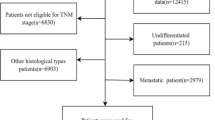Abstract
Objective
The breast cancer lack of expression of estrogen receptor (ER), progesterone receptor (PR), and human epidermal growth factor receptor 2 (HER-2) is defined as the Triple-negative breast cancer (TNBC). Our purpose is to compare the response and long-term effect of the TNBC and non-TNBC patients receiving neo-adjuvant anthracycline-based chemotherapy, and to investigate the mechanisms of TNBC affecting the survivals.
Methods
Data of long-term follow-up (median, 5.4 years) of 326 patients who received neo-adjuvant chemotherapy with anthracycline-based regimen, during a period from 2000 to 2003, were analyzed. Expressions of ER, PR, HER-2, P53, Ki-67 and E-cadherin were determined using immunohistochemical staining method. A multivariate Cox regression analysis was used to analyze independent prognostic factors affecting the relapse-free survival (RFS) and overall survival (OS) rates. Clinical effects of the neo-adjuvant anthracycline-based chemotherapeutic regimen and the RFS and OS rates were compared between the patients with TNBC and non-TNBC, and the correlations among the triplenegative phenotype (TNP), tumor grading and the expressions of P53, Ki-67 and E-cadherins were analyzed.
Results
TNP, TNM staging, histological grades, clinical response of the neo-adjuvant chemotherapy and pathological complete remission (pCR) rate were the independent prognostic factors affecting the survival rates. Furthermore, 70 (21.5%) of the 326 patients suffered TNBC. Compared with the subjects in non-TNBC group, the patients with TNBC had a significantly higher pCR rate (P = 0.046) and clinical response rate (P = 0.037), but also decreased 5-year RFS (P = 0.001) and OS (P = 0.004) rates. The RFS and OS rates were not improved in the TNBC patients who achieved a clinical remission after the neo-adjuvant chemotherapy. The triple-negative phenotype was positively correlated with the level of P53, Ki-67 expression (P = 0.007, P = 0.028), but negatively correlated with level of E-cadherin (P = 0.034).
Conclusion
Both clinical remission rate and pCR rate of the TNBC patients receiving neo-adjuvant anthracycline-based chemotherapy are high, however, the long-term effect is poor. The mechanism may relate to a strong potential of proliferation and invasive metastasis, as well as lack of an effective therapeutic target in the TNBC patients.
Similar content being viewed by others
References
Rakha EA, El-Rehim DA, Paish C, et al. Basal phenotype identifies a poor prognostic subgroup of breast cancer of clinical importance. Eur J Cancer 2006; 42: 3149–3156.
Carey LA, Dees EC, Sawyer L, et al. The triple negative paradox: primary tumor chemosensitivity of breast cancer subtypes. Clin Cancer Res 2007; 13: 2329–2334.
Carey LA, Metzger R, Dees EC, et al. American joint committee on cancer tumor-node-metastasis stage after neoadjuvant chemotherapy and breast cancer outcome. J Natl Cancer Inst 2005; 97: 1137–1142.
Chollet P, Amat S, Belembaogo E, et al. Is Nottingham prognostic index useful after induction chemotherapy in operable breast cancer? Br J Cancer 2003; 89: 1185–1191.
Rakha EA, El-Sayed ME, Green AR, et al. Prognostic markers in triple-negative breast cancer. Cancer 2007; 109: 25–32.
Yang DH, Li H, Zhao J. Clinicopathologic feature and prognosis of triple negative breast cancer. Zhongguo Zhongliu Linchuang Zazhi 2008; 35: 501–504 (Chinese).
Mieog JS, van der Hage JA, van de Velde CJ. Neoadjuvant chemotherapy for operable breast cancer. Br J Surg 2007; 94: 1189–1200.
Rouzier R, Perou CM, Symmans WF, et al. Breast cancer molecular subtypes respond differently to preoperative chemotherapy. Clin Cancer Res 2005; 11: 5678–5685.
Umemura S, Takekoshi S, Suzuki Y, et al. Estrogen receptor-negative and human epidermal growth factor receptor 2-negative breast cancer tissue have the highest Ki-67 labeling index and EGFR expression: gene amplification does not contribute to EGFR expression. Oncol Rep 2005; 14: 337–343.
Bhatavdekar JM, Patal DD, Shan NG, et a1. Prognostic significance of immunohistochemicaIly localized biomarkers in stage II and stage III breast cancer: a multivariate analysis. Ann Surg Oneol 2000; 7: 305–311.
Donehower LA, Harvey M, Slagle BL, et al. Mice deficient for p53 are developmentally normal but susceptible to spontaneous tumors. Nature 1992; 356: 215–221.
Feki A, Irminger-Finger I. Mutational spectrum of p53 mutations in primary breast and ovarian tumors. Crit Rev Oncol Hematol 2004; 52: 103–116.
Li JF, Sun SL, Yang W, et al. The relationship between expression of p53, Cat-D, p16 and pS2 and Prognosis of primary breast cancer. Zhongguo Zhongliu Linchuang Zazhi 2003; 30: 588–590 (Chinese).
Frixen UH, Behrens J, Sachs M, et al. E-cadherin-mediated cell-cell adhesion prevents invasiveness of human carcinoma cells. J Cell Biol 1991; 113: 173–185.
Berx G, Van Roy F. The E-cadherin/catenin complex: an important gatekeeper in breast cancer tumorigenesis and malignant progression. Breast Cancer Res 2001; 3: 289–293.
Author information
Authors and Affiliations
About this article
Cite this article
Sun, Z., Ma, X., Wu, Y. et al. Response and long-term effect of patients with triple-negative breast cancer receiving neo-adjuvant anthracycline-based chemotherapy. Clin. Oncol. Cancer Res. 6, 197–202 (2009). https://doi.org/10.1007/s11805-009-0197-5
Received:
Accepted:
Published:
Issue Date:
DOI: https://doi.org/10.1007/s11805-009-0197-5




